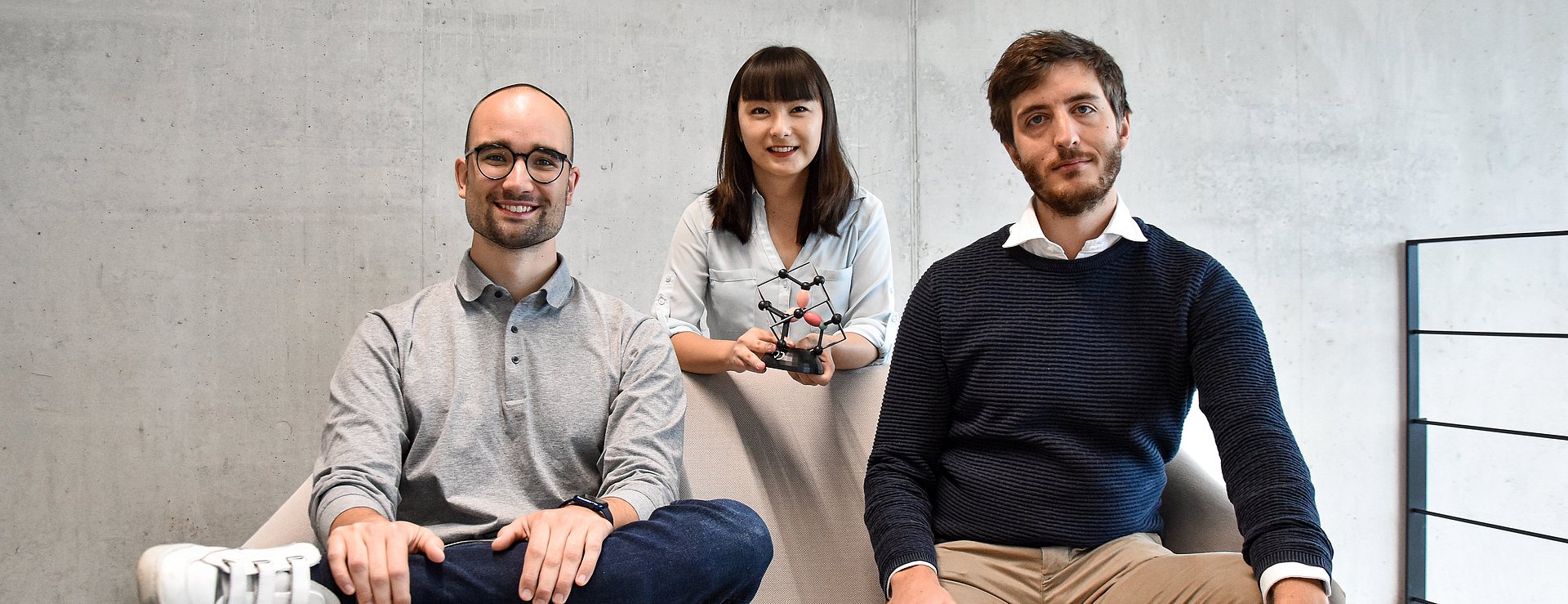
TUM Founder's Talk: Quantum Diamonds
As of February 2023
What problem do you solve with your product/idea?
Conventional sensors are increasingly reaching their physical limits and can no longer be made smaller or are limited in their sensitivity. One concrete application of many is quality control in the semiconductor industry: Integrated Circuits reach structures in the nanometer range, but non-invasive possibilities for quality control are not able to detect the smallest leakage currents. In the future, our sensors will be able to identify possible defects at an early stage in quality control and thus improve the efficiency of semiconductor production.
What is the technology behind the product?
We use a so-called nitrogen defect center (NV) in diamond for our sensor technology. Such a NV center is created by exchanging two neighboring carbon atoms of the diamond lattice for a nitrogen atom and a neighboring "vacancy", the so-called defect. Diamond provides an ideal environment for quantum states for this purpose, since this material isolates the vacancies extremely well from perturbations in the surrounding environment. In other words, a high-purity artificial diamond is intentionally altered at the atomic level so that it can be used as a sensor. The measurement principle is based on the disturbance of the quantum properties of this defect by temperature as well as magnetic and electric fields, which can be read optically.
Who in the team takes on which tasks? Do you all work together on different topics, or does everyone in the team have a special area of work?
In the team, everyone takes on a special area of work: Kristina and Robin are responsible for the production of the diamonds and take on all the steps that turn a synthetic diamond into a sensor. Fleming takes care of the technical development and integration of the sensor into complete solutions, especially when working with industrial companies. Kevin is responsible for the commercial aspects, including private and public financing, marketing, legal issues, and outreach to industrial companies. Professor Bucher provides support in technical development as well as strategic issues.
What personal skills does the team bring to the development of the product? (Work experience and/or industry knowledge in the target market, start-up experience, etc.)?
The team brings deep expertise in quantum sensing through Fleming and Kristina's PhDs. These individuals have already spent years in diamond research. They are supported by current PhD student Robin and a professor, Dominik. Kevin, with his experience at McKinsey, brings understanding of innovation processes in industry as well as business knowledge to the start-up.
What strategies or considerations do you have for market entry? What are the difficulties in doing so?
We have a start-up focused on selling diamonds as sensors. Our target markets are two very different areas: The research market and the industrial applications market. In the research market, we sell our diamonds to research groups around the world who use them in their experimental setups. In the industrial applications market, we plan to collaborate with large companies such as Bosch or Siemens, who will integrate our sensors into their equipment. It is important to note that the two markets operate very differently: While in the research market the properties of our diamonds are decisive, in industry many factors (price, delivery time, reliability, robustness) play a role.
What approaches are there to remain competitive in the future?
In general, the quantum sensing market is at a very early stage. Therefore, a lot of innovation takes place in the research environment. Here, we want to stay close to TUM, as various professors here are doing research in this area. At the same time, it also helps a lot to have talent on the team that has the appropriate education, such as a master's or PhD in quantum technologies. Here, too, we want to attract a large number of PhD students to our team in order to understand market trends at an early stage.
What skills should you have if you want to found a start-up and what are the biggest challenges you face as a founder?
If you want to found a start-up, you should have a high level of resilience to permanent uncertainty in order to deal with the challenges in entrepreneurship. At no time in the start-up process is everything "ready": either the product is not yet ready or there is a lack of further capital to hire the right people. At the same time, it is often necessary to understand exactly what customers want and which suppliers you need to work with. It helps to develop an optimistic attitude and a "just do it" mentality in order to be able to solve a variety of problems and thus move forward quickly.
What funding options do you already take advantage of, or plan to take advantage of in the future?
We take advantage of various financing options to fund our company. In addition to the EXIST start-up grant, which mainly covers a basic salary for the founders, we are funded through a validation project of the Federal Agency for Leap Innovations, which investigates the use of our sensors in the field of microscopy. In addition, we are able to cover further material expenses via a wall loan from UnternehmerTUM and the ESA BIC program.